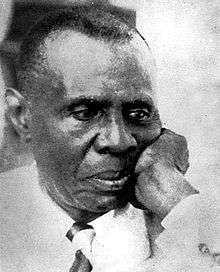Jean Price-Mars

Jean Price-Mars (15 October 1876 – 1 March 1969), born in Grande Rivière du Nord, was a Haitian teacher, diplomat, writer, and ethnographer. Price-Mars served as secretary of the Haitian legation in Washington (1909) and as chargé d'affaires in Paris (1915–1917), during the initial years of the United States occupation of Haiti.
In 1922 Price-Mars completed medical studies which he had given up for lack of a scholarship. After withdrawing as a candidate for the presidency of Haiti in favor of Stenio Vincent in 1930, Price-Mars led Senate opposition to the new president; he was forced out of politics. In 1941, Price-Mars was again elected to the Senate. He was secretary of state for external relations in 1946 and, later, ambassador to the Dominican Republic. In his eighties, he continued service as Haitian ambassador at the United Nations and ambassador to France.
Negritude movement
Price-Mars' writings championed the Negritude movement in Haiti, which "discovered" and embraced the African roots of Haitian society. Price was the first prominent defender of vodou as a full religion complete with "deities, a priesthood, a theology, and morality." He argued against the prevailing prejudice and ideology, which favored European cultures from the colonial period and rejected non-white, non-Western elements of the cultures of the Americas. His Haitian nationalism embraced a cultural identity as African through slavery, in contrast to the neighbouring Dominican Republic, which prided itself as affiliated with Spanish culture. Historically the latter country had a much lower proportion of slaves in its population and had a different colonial history than did Haiti.
Price-Mars' attitude was inspired by the active resistance by Haitian peasants to the 1915 to 1934 United States occupation. He deplored the elite's abandonment of the tradition that had emphasized the nation's achieving independence from French colonialism, but he took pride in the conduct of the poor. He attacked the elite for their "inability to promote the welfare of the Haitian masses."
Bovarism
He coined the term "collective Bovarism" to describe the mixed-race elite as identifying with their partial European ancestry while denouncing ties to their African legacy. He adapted the term from Gustave Flaubert's novel Madame Bovary, in which Emma Bovary is anxious to escape from social conditions which define her, but which she deprecates. He noticed that the elite were composed almost exclusively of people of mixed ancestry, descended from former free persons of color, who embraced their "whiteness." Most Haitians were more exclusively African in descent. His disdain for the elites spread beyond their racial purity of "Bovarism".
He believed they had unfair economic and political influence. He understood that their power base in the state system relied heavily on the taxation of crops, especially of coffee, the chief export, grown by the peasants who had come to the country's defense when the elites had abandoned it to protect their own interests.
He also attacked the elites' role in Haitian education. The elite believed they needed to civilize the masses. Price-Mars wrote frequently about educational programs. He examined the "intellectual tools" available in Haiti and challenged the elite to promote progress among the masses because of their advantage of position. He ultimately came to embrace Haiti's slavery history as the true source of the Haitian identity and culture. He admired the culture and religion developed among the slaves as their base for rebelling against the Europeans and building a Haitian nation.
Notable works
Some of his most notable works are the book Ainsi parla l'oncle (1928), which was translated into English as So Spoke the Uncle, La Vocation de l'elite (1919), La République d'Haïti et la République Dominicaine (1953), and De Saint-Domingue à Haïti (1957).
Further reading
- Jean Price-Mars and Haiti, by Jacques C. Antoine. Three Continents Press. 1981
- San Miguel, Pedro L. (2005). The Imagined Island: History, Identity, and Utopia in Hispaniola. United States: The University of North Carolina Press. pp. 67–97. ISBN 0-8078-5627-4.
- Schutt-Ainé, Patricia (1994). Haiti: A Basic Reference Book. Miami, Florida: Librairie Au Service de la Culture. p. 105. ISBN 0-9638599-0-0.
- "The Religious Imagination and Ideas of Jean Price-Mars" (Part 1), by Celucien Joseph, Journal of Race, Ethnicity, and Religion Volume 2, Issue 14 (December 2011):1-31
- Joseph, Celucien L. From Toussaint to Price-Mars: Rhetoric, Race, and Religion in Haitian Thought (CreateSpace Independent Publishing Platform, 2013)
|